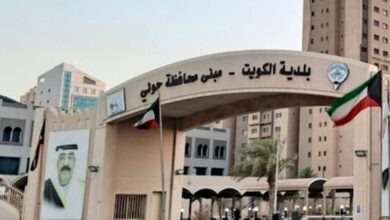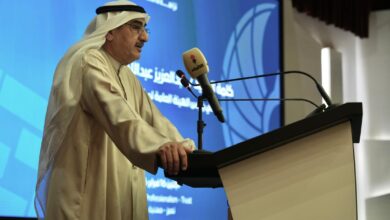Government priorities sync with ESCWA observations

THE TIMES KUWAIT REPORT
The government’s plans and policies being implemented currently are the right measures needed to develop a strong and sustainable economy capable of supporting the country’s growth and ensuring welfare of citizens now and in the future. These actions also dovetail with the latest observations and suggestions made in a new report on the Kuwaiti economy, by the United Nations Economic and Social Commission for Western Asia (ESCWA).
The hard-hitting, objective report by ESCWA notes that the economy in Kuwait, which is predominantly reliant on hydrocarbon resources, faces persistent challenges in achieving fiscal sustainability and economic diversification. The slow pace of diversification, the declining share of non-oil revenues in gross domestic product (GDP), and the heavy dependence on oil income, expose the economy to geopolitical shocks and international oil price volatility.
Warning that the window for implementing critical fiscal and structural reforms is shrinking rapidly, the UN report, which focuses on social spending, stresses that Kuwait must take immediate and decisive action to optimize public spending, increase efficiency, and align social expenditure with national development priorities. It calls for swift measures to address current challenges in order to ensure long-term fiscal stability and sustainability, and to achieve inclusive, sustainable development.
Since taking office in April 2024, the government headed by His Highness the Prime Minister Sheikh Ahmad Abdullah, under the directives and wise guidance of HIs Highness the Amir Sheikh Meshal Al-Ahmad Al-Jaber Al-Sabah and His Highness the Crown Prince Sheikh Khaled Hamad Al-Jaber Al-Sabah, has to its credit been rolling out a series of calibrated fiscal and structural reforms aimed at supporting economic growth and promoting sustainable development.
Recent policies and reforms being enacted by the government have imparted impetus to the implementation of projects in infrastructure, urban development, renewable energy, and tourism, as well as in digitalization of public services. Media reports indicate that in the latest move to strengthen fiscal stability, the government is preparing to issue a public debt bill that would allow Kuwait, when deemed necessary, to raise up to KD20 billion through debt instruments in the international debt market over a 50 year period.
Lapse of the previous debt law in 2017 and its non-renewal due to political objections, had hamstrung the ability of governments over the past eight years to fund vital development projects. It had also precipitated economic liquidity crunches in the past and contributed to repeated deficit budgets, including to the general budget for fiscal year 2025-26 submitted to the Cabinet last week.
With expected revenue of KD18. 2 billion and expenditure at KD24.5 billion, the budget deficit of KD6.3 billion is nearly 12 percent higher than in fiscal year 2024-25. Nearly 80 percent of government spending in the budget has been allocated for salaries, subsidies and other social support mechanisms. The latest ESCWA report is particularly critical of Kuwait’s continued inefficiencies in public spending.
The UN report, aptly titled ‘Social spending, expenditure efficiency and fiscal sustainability: Strategies to rebalance the Kuwait budget’, critically analyses public spending and mobilization of non-oil revenues in Kuwait. It observes major inefficiencies in resource allocation, including in social spending and public transfers that pose a risk to the country’s fiscal sustainability.
The report notes that Kuwait allocated a larger share of its GDP—around 50 percent in 2023—on public expenditure, compared to the global average of 37 percent, and higher than the 41 percent average in high-income countries (HIC). However, most of this public spending— 93 percent in fiscal year 2023-24— was allocated to current expenditures, mainly to public sector employee compensation and the purchase of goods and services.
The generous but less efficient public spending is reflected in Kuwait’s lower outcomes on the United Nations Sustainable Development Goals (SDG) index, which measures progress towards achieving the 17 SDG goals. Based on the budget for fiscal year 2023-24, the SDG Index shows that public expenditure in Kuwait attained an efficiency score of 0.54 on a scale of 0 to 1—significantly lower than the global average of 0.74 and HIC average of 0.85.
The ESCWA study pointed out that improving efficiency to the global average level could have saved around KD6.8 billion, equivalent to 27 percent of public expenditure in the 2023-24 budget. These savings could have been redirected to critical sectors, such as infrastructure, education, and healthcare to drive sustainable development.
The UN report is also critical of public spending on education, noting that despite allocating nearly 6 percent of GDP to education— higher than the global average of 3.3 percent—educational outcomes in Kuwait have remained suboptimal. Education spending is primarily directed toward operational costs, such as salaries and facilities, with minimal investment in research, curriculum innovation and digital tools. Addressing these gaps is crucial for building a skilled workforce capable of supporting and participating effectively in the economy.
Turning to the country/s subsidy programs, particularly in energy, which consume a significant share of the budget, the report observed that subsidy allocations were regressive in that it disproportionately benefits higher-income groups. The study added that rationalization and improved targeting of subsidies could efficiently enhance equity and reduce fiscal pressure.
Realizing that diversifying the heavily oil-reliant economy is pivotal to achieving the country’s ambitious Vision 2035, the Kuwaiti government has over the past eight months been initiating several policies and initiatives focused on promoting non-oil sector growth and attracting foreign investment. The government is also fostering greater private sector engagement in the economy through public-private partnerships in infrastructure, utilities, and urban development projects.
With just a decade remaining to realize the country’s ambitious Vision 2035, the authorities have been working to achieve projects and goals outlined in the country’s current national development plan 2020-2025.
Preparations are also underway for the remaining two contiguous five-year national development plans that lead to the Vision 2035 goal of establishing Kuwait as a regional and international financial and commercial hub.
Kuwait’s Vision 2035 aims to foster human development, improve production efficiency, and enhance competitiveness, under a supportive institutional framework that reinforces national values and preserves social identity, while providing the appropriate infrastructure for a conducive and developed business environment.
Vision 2035 is also designed to work cohesively to achieve the SDGs. The General Secretariat of the Supreme Council for Planning and Development (SCPD) is tasked with monitoring the Kuwait Development Plan’s alignment with the SDGs. In its October 2024 report, the General Secretariat highlighted the efforts being directed to support SDGs, including through developing human capital, reforming public administration, and enhancing transparency, accountability, and effectiveness of the government.
To achieve its goals and aspirations of Vision 2035, and to ensure long-term sustainable prosperity of the nation, Kuwait could further align its plans with the recommendations outlined in the ESCWA report to:
- Promote economic diversification and expand non-oil revenues.
- Encourage ‘smart’ spending to enhance expenditure efficiency and reduce public fund wastage.
- Reform subsidies and universal transfer programs.
- Foster resilient and inclusive economic growth
- Implement education sector reforms to improve the quality of education and reinforce human capital.
- Improve the healthcare system to promote healthier lifestyles.
- Implement performance- based budgeting on a gradual basis to improve the effectiveness of public expenditure.
- Enhance fiscal discipline and transparency
- Leverage data-driven frameworks to enhance public financial management.
- Align spending with the SDGs.
By adopting and adapting the above recommendations, Kuwait can transition to a more inclusive, equitable and resilient economy that syncs with Kuwaiti national development priorities. Moreover, by aligning fiscal policies with the SDGs and prioritizing efficiency, Kuwait can ensure that public spending delivers meaningful outcomes for all citizens.












